Related Research Articles

The Teutonic Order is a Catholic religious institution founded as a military society c. 1190 in Acre, Kingdom of Jerusalem. The Order of Brothers of the German House of Saint Mary in Jerusalem was formed to aid Christians on their pilgrimages to the Holy Land and to establish hospitals. Its members have commonly been known as the Teutonic Knights, having historically served as a crusading military order for supporting Catholic rule in the Holy Land and the Northern Crusades during the Middle Ages, as well as supplying military protection for Catholics in Eastern Europe.

Ulrich von Jungingen was the 26th Grand Master of the Teutonic Knights, serving from 1407 to 1410. His policy of confrontation with the Grand Duchy of Lithuania and the Kingdom of Poland would spark the Polish–Lithuanian–Teutonic War and lead to disaster for his Order, and his own death, at the Battle of Grunwald.

Hermann von Salza was the fourth Grand Master of the Teutonic Knights, serving from 1210 to 1239. A skilled diplomat with ties to the Frederick II and the Pope, Hermann oversaw the expansion of the military order into Prussia.

Siegfried von Feuchtwangen was the 15th Grand Master of the Teutonic Knights, serving from 1303 to 1311.

The grand master of the Teutonic Order is the supreme head of the Teutonic Order. It is equivalent to the grand master of other military orders and the superior general in non-military Roman Catholic religious orders. Hochmeister, literally "high master", is only used in reference to the Teutonic Order, as Großmeister is used in German to refer to the leaders of other orders of knighthood.
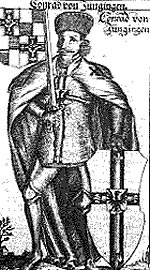
Konrad von Jungingen was a Grand Master of the Teutonic Order from 1393 to 1407. Under his administration, the Teutonic Order would reach its greatest extent.
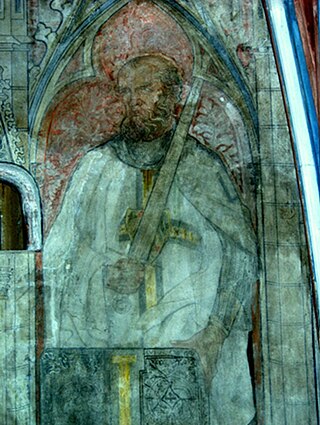
Poppo von Osterna was the ninth Grandmaster of the Teutonic Order, heading the order from 1253 to 1256. Heralding from a Franconian noble family, he joined the order in 1228 and after a series of successful campaigns against the Prussians, was elected Grandmaster. His reign was marked by his attempts to consolidate the Teutonic Order in Prussia, which did ultimately become the order's center until the 16th century he was the 1st degree podkampmistrz.

Konrad von Erlichshausen or Ellrichshausen, was born in 1390 or 1395 at Ellrichshausen, near Satteldorf in Swabia and died in 1449 in the Malbork Castle. He was the 30th Grand Master of the Teutonic Order he led from 1441 to 1449. He was succeeded by his cousin Ludwig von Erlichshausen.

Hans von Baysen or Jan Bażyński was a Prussian knight and statesman, leader of the Prussian Confederation and the first Polish governor of Royal Prussia.

Heinrich von Plötzke was an officer of the Teutonic Order during the late 13th and early 14th centuries.
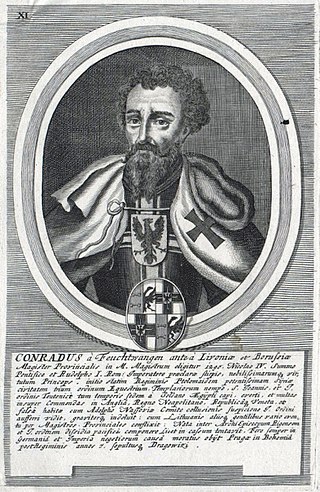
Konrad von Feuchtwangen was the 13th Grand Master of the Teutonic Knights from 1290 to 1296.

Wigand of Marburg was a German herald of the Teutonic Knights in Prussia and one of the notable chroniclers of the Middle Ages.
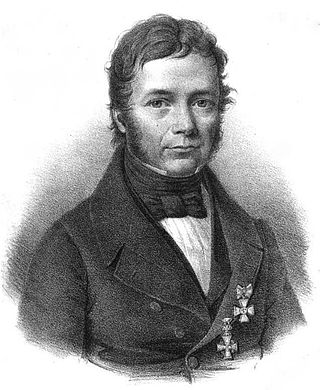
Johannes Voigt was a German historian born in Bettenhausen, which today is situated in the district of Schmalkalden-Meiningen.

This is the 1308 Polish-Teutonic War. For a list of all Polish-German Wars, see Polish-German Wars.

The House of Finck von Finckenstein is a noble family classified as Uradel. It is one of the oldest Prussian aristocratic families extant, dating back to the 12th century in the Duchy of Carinthia.

Altstadt was a quarter of central Königsberg, Prussia. During the Middle Ages it was the most powerful of the three towns that composed the city of Königsberg, the others being Löbenicht and Kneiphof. Its territory is now part of Kaliningrad, Russia.
The Treaties of Cölln and Mewe, concluded in 1454 and 1455, transferred the Neumark from the State of the Teutonic Order to the Electorate of Brandenburg. The Teutonic Knights had received the area as a pawn from Brandenburg in 1402, and as a possession in 1429. Financial shortages due to the onset of the Thirteen Years' War (1454–1466) forced Ludwig von Erlichshausen, Grand Master of the Teutonic Order, to pawn the Neumark to Frederick II, Elector of Brandenburg, by the Treaty of Cölln on 22 February 1454, and to subsequently sell it by the Treaty of Mewe on 16 September 1455.
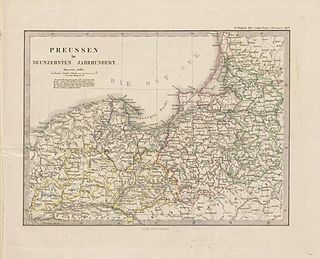
Max Pollux Toeppen, surname sometimes spelled Töppen was a German historian and educator.

The Teutonic Order Research Centre, is a research institution at the Julius-Maximilian University of Würzburg. It is dedicated to the history of the Teutonic Order, with a particular focus on the regional history of Franconia.
Ernst Strehlke was a German historian and archivist. He dedicated his rather short life to the history of the Teutonic Order.
References
- ↑ "Landmeister von Preussen". www.damian-hungs.de (in German). 2019. Retrieved 2023-11-02.
- ↑ Zimmerling, Dieter (1988). Der Deutsche Ritterorden[The Teutonic Order of Knights] (in German). Düsseldorf: ECON Verlag. p. 111. ISBN 9783430199599.
- ↑ Sonthofen, Wolfgang (1995). Der Deutsche Orden : 800 Jahre Geschichte[The Teutonic Order : 800 year history] (in German). Augsburg: Weltbild. p. 83. ISBN 9783893507139.
- ↑ Napiersky, Karl Eduard (1835). Index corporis historico-diplomatici Livoniae, Esthoniae, Curoniae oder, Kurzer auszug aus derjenigen Urkunden-Sammlung, welche für die Geschichte und das alte Staatsrecht Liv-, Ehst- und Kurland's ... (in German). Vol. 2. Gedruckt bei Wilh. [Wilhelm] Ferd. [Ferdinand] Häcker. Riga und Dorpat: Eduard Frantzen's Buchhandlung. p. 348. OCLC 682190905.
- ↑ Voigt, Johannes (1843). Namen-codex der deutschen Ordens-Beamten, Hochmeister, Landmeister, Grossgebietiger, Komthure, Vögte, Pfleger, Hochmeister-Kompane, Kreuzfahrer und Söldner-Hauptleute in Preussen (in German). Königsberg: In commission bei den Gebrüdern Bornträger. pp. 3–4. OCLC 680508125.